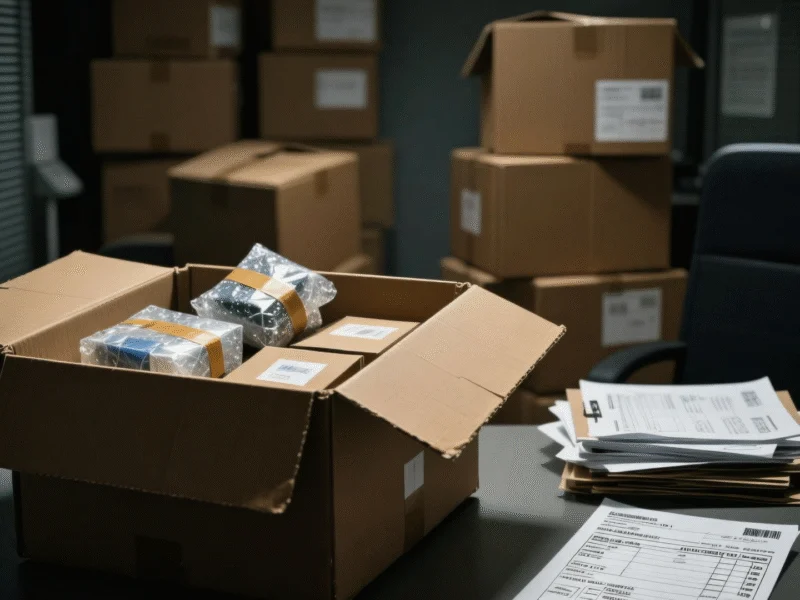Widespread Billing Errors Plague UPS Cross-Border Shipments
UPS customers are reporting significant tariff classification errors affecting US-bound shipments, with many being incorrectly charged the 200% duty rate for Russian aluminum despite shipping entirely different products. The shipping giant faces mounting complaints from businesses struggling with unexpected customs bills that sometimes exceed the value of their shipments, creating financial strain and logistical nightmares for companies relying on cross-border commerce.
According to multiple customer accounts, the problems appear to stem from systemic issues within UPS’s customs brokerage operations. Business Insider’s investigation revealed that UPS tariff disputes have left numerous customers facing erroneous Russian aluminum classifications despite providing accurate shipping documentation. The situation has become so problematic that some shipments have been threatened with destruction if the incorrect tariffs remain unpaid.
Case Studies: Real Businesses Facing Erroneous Charges
Sean Dickinson, facilities manager at SoCal Swords, experienced the issue firsthand when his company ordered a pair of high-carbon steel recreational swords from a Canadian artisan. Despite the supplier using the correct classification code for outdoor sporting equipment, UPS processed the shipment as eight pounds of bulk aluminum from Russia, resulting in a $2,074 tariff bill on a $1,098 shipment.
“I’m concerned that UPS won’t release our shipment without payment at this incorrect, inflated rate,” Dickinson told Business Insider. The situation echoes broader concerns about supply chain disruptions affecting multiple industries, where classification errors create cascading problems throughout the logistics ecosystem.
Kunal Sharma, a Canadian auto-parts business owner, faced similar challenges when shipping a carbon-fiber car part worth approximately $200 to a US customer. The package arrived with a $400 customs bill incorrectly classified as Russian aluminum. “There’s not any aluminum in this product,” Sharma emphasized, highlighting the fundamental classification errors occurring within UPS’s system.
Systemic Problems Following Tariff Exemption Changes
Matt Collinson, president of Canada-based Mr. Speedometer, noted that the erroneous tariff charges began shortly after the end of the de minimis tariff exemption in late August. Since then, his company has experienced returned packages, frustrated customers hit with unexpected tariffs, and shipments left in limbo despite providing complete documentation.
“It’s almost as if UPS’s system is so slammed that they don’t know how to handle the volume, or they just have people not knowing what they’re doing,” Collinson observed. “A lot of stuff is clearly falling through the cracks.” The situation reflects broader trade-related uncertainties affecting global supply chains and customs processing across multiple carriers.
In one particularly egregious case, Collinson’s customer in Oregon purchased a $53 rotational cable for a Ford vehicle but received a 250% tariff charge, primarily composed of the 200% Russian aluminum duty. The customer ultimately paid the incorrect fee out of necessity, highlighting the power imbalance between shipping companies and their customers.
UPS’s Response and Brokerage Process Questions
UPS maintains that its processes should prevent such errors. A company spokesperson told Business Insider that “UPS uses customer-supplied information about a shipment to calculate the duties and fees, based on regulations from CBP and other government agencies.” The spokesperson described the “rating” process as considering specific imported items and their countries of origin, with “highly trained” brokers using “sophisticated technology to ensure accuracy.”
However, this description contrasts sharply with customer experiences. Jim Legary, chief operating officer of Canadian company Aquaventronics, discovered that UPS assessed a 35% tariff on equipment that should have been duty-free under the United States-Mexico-Canada Agreement. Despite reaching out to UPS executives and receiving promises of investigation from the global brokerage division, Legary told Business Insider he hasn’t received updates or reimbursement.
The persistent nature of these errors suggests deeper operational challenges within UPS’s customs brokerage operations. As major financial institutions monitor economic impacts of trade disruptions, businesses caught in these tariff disputes face real financial consequences without clear resolution pathways.
Broader Implications for Cross-Border Commerce
The tariff classification errors represent just one element of apparent logistical challenges affecting UPS shipments to the United States. Business Insider previously reported that UPS informed some customers their packages were marked for destruction after sitting for extended periods at UPS facilities, compounding the financial risks for businesses relying on international shipping.
Customers report that contesting these erroneous charges remains exceptionally difficult, with limited customer service options and unclear appeal processes. The combination of incorrect tariff applications, threatened package destruction, and inadequate resolution mechanisms creates significant barriers for small and medium-sized businesses engaged in cross-border trade.
As these issues persist without clear explanation from UPS, affected businesses must weigh the risks of continued reliance on the shipping giant against the operational challenges of switching carriers. The situation underscores the vulnerability of businesses to logistical errors in an increasingly complex global trade environment.



